Cynthia Leck and Juetzinia Kazmer-Murillo on Igniting Agency in Early Learners
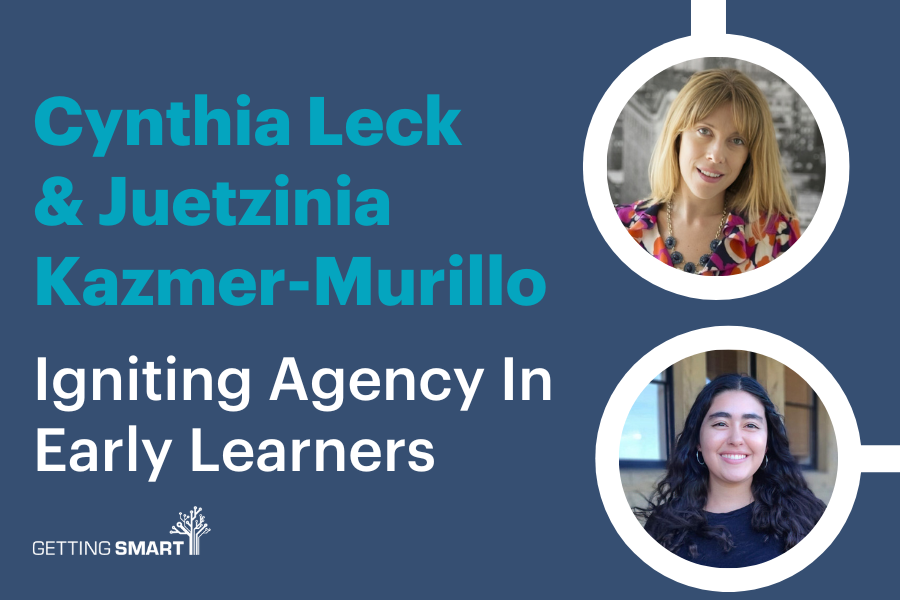
On this episode of the Getting Smart Podcast Rebecca Midles is joined by two members of the Transcend Usable Knowledge team —Cynthia Leck, and Juetzinia Kazmer-Murillo, to discuss their new report Igniting Agency in Early Learners.
They begin with an overview of the team’s work, which includes extensive reading and synthesizing information to create actionable resources for community design processes. The emphasis is on acknowledging the diversity of communities in the U.S. and the importance of balancing external knowledge with the unique, contextual knowledge of each community.
The guests discuss the iterative process of developing a primer on agency (their new report), which is aimed at making the concept understandable and applicable for community and educational leaders. This process involved collaboration with scholars, school leaders, and organizations to refine their conceptual framework and ensure its relevance. The conversation also covers innovative practices for fostering learner agency in the classroom, emphasizing the importance of metacognitive skills and self-assessment in empowering young learners.
Cynthia Leck
Cynthia began her career in education as an English language arts teacher in New York City. She taught in traditional and charter public schools as well as designed curriculum for college preparatory programs before transitioning to work as an education researcher and consultant at Columbia University through the Center for Public Research and Leadership. While there, her work focused on continuous improvement, network and systems theory, and personalized learning implementation.
As part of Transcend’s Build Knowledge team, Cynthia translates what is known about effective teaching and learning, scaling transformational practices, and more into actionable insights for Transcend’s partners and the field, while also helping partners learn from and improve on the creative practices they already employ each day.
Juetzinia Kazmer-Murillo
At Transcend, Juetzinia is a Usable Knowledge Associate on the Products & Capacity Building Team, working to develop rigorous resources grounded in research and effective practice for Transcend’s partners and beyond.
Prior to joining Transcend, Juetzinia worked as a Project Coordinator for Fulbright Teacher Exchanges at IREX, where she supported high-quality professional development programming for international educators. Before that, Juetzinia was an English Teaching Assistant in secondary classrooms in Madrid, first under the Fulbright U.S. Student Program, then under the Auxiliaries de Conversación Program. In 2016, Juetzinia received a Fulbright grant renewal to act as the Culture and Pedagogy Mentor for first-year grantees in Spain, where she built pedagogical resources and programming on topics such as content and language-integrated learning and human rights education. Juetzinia’s current research interests include bi/multilingual education, translanguaging, and teacher preparation.
Links:
- Igniting Agency in Early Learners
- Cynthia Leck
- Cynthia Leck LinkedIn
- Juetzinia Kazmer-Murillo
- Juetzinia Kazmer-Murillo LinkedIn
- Transcend
- Transform Learning with Community-Based Design
- Agency and Young Children Research Collaborative
Transcript
- Introduction to Usable Knowledge Team (00:10 – 01:11)
- Approach to Community-Based Design (01:18 – 03:57)
- Defining Agency and Creating Resources (04:23 – 07:50)
- Innovative Practices for Growing Learner Agency (08:37 – 09:52)
- Supporting Young Learners Agency (10:23 – 12:10)
- Self-Assessment and Pre-Assessment (12:40 – 14:44)
- Closing Thoughts and Further Learning (15:30 – 18:14)
Introduction
Rebecca Midles: You’re listening to the Getting Smart Podcast. I’m Rebecca Midles and I’m excited about our conversation around learner agency and community design. Today we’re joined by two members of the Transcend usable Knowledge team, Cynthia Leck and Juetzinia Kazmer-Murillo. Welcome. Can you tell us a little bit about your role on the Usable Knowledge Team?
Cynthia Leck: Yeah, the usable knowledge team’s goal is really to bring in existing knowledge to the design process that we engage in with schools and communities across the country. So we have a team of six awesome individuals who do a lot of reading and making knowledge that’s out there accessible and actionable to folks who are on design teams because there’s just so much good knowledge out there and sometimes really hard for schools to bring that all to bear in their process themselves.
Juetzinia Kazmer-Murillo: I sit on the team with Cynthia, and a lot of the work that I do is reading and writing all day, learning from communities and synthesizing that into actionable resources for folks within the community design process.
Community-Based Design
Rebecca Midles: I know that Transcend operates with a belief of focusing on existing knowledge and understanding. Can you share an overview of the approach you took to that community-based design in terms of your intentional framing?
Cynthia Leck: Yeah, so I think we really view the school change or district transformation process as unique to each community. And so there’s no real one-size-fits-all all design that we are trying to spread in the US. We’re such a diverse community in the US with these kinds of sub-communities, if you will, and we are trying to acknowledge that fact by balancing that there’s a lot of great knowledge out there across the education space with the fact that communities have a lot of unique contextual knowledge that they could bring to bear, too. So the Usable Knowledge team is all about surfacing knowledge from outside the community, from academic research, from other schools, from other organizations, and then making it accessible so that the communities themselves can focus on bringing to bear the knowledge that they hold.
Rebecca Midles: It’s a wonderful, equitable practice. I hear a lot of similarities about just personalized learning in general, but essentially you’re meeting a community, and it sounds like honoring their strengths and then bringing in appropriate resources to co design a future. What was the process for developing the primer around this and the accompanying resources? And were there any unexpected challenges or outcomes that you’d like to share?
Juetzinia Kazmer-Murillo: Yeah, so the process we took was actually quite iterative. The version that we have on the website is our third version, and so it’s had many different lives, thanks to all the knowledge that we’ve learned from folks and what we’ve read. We began by reading as much as we could on the topic. And I also had the note that this resource does not seek to be a, you know, systematic review of the literature. Rather, we tried to read really intentionally and focus on questions that we felt were most important for the communities that were using it. So I wanted to add that framing at the top.
We began by reading as much as we could about agency, focusing on questions of, like, why is it important to focus on agency, what enables it? How can learning communities really support it? We spent a lot of our time digging into that content. And while we read, we also decided there’s so much to learn. We can be way more efficient with our time by speaking directly with communities and experts. And so we spoke with scholars, leaders at schools, leaders at different organizations to learn from them, but then also put things in front of them and asked hey, what do you think about this? Does this conceptual framework make sense to you? What are we missing? Where are the gaps? And so we learned so much by putting things in front of people and gathering their feedback.
Defining Agency and Creating Resources
Rebecca Midles: I hear real attention to the collective efficacy of the community and ensuring that their space for individual agency shows up. I really appreciate that, that doesn’t often get surfaced. Sometimes we’ll talk about individualized learning, and we just keep it there, but we don’t talk about that greater piece of being part of a community and where that shows up and creating that. I really appreciate how Transcend is committed to defining agency in this way and also the way that you and the resource made it very usable and accessible for others. What was the process used to create that definition, other than what you’ve shared here with schools? And after you’ve started that draft, you said it was three revisions, so maybe you could share a little bit about that and perhaps even about the graphic that you landed on as well in this resource.
Juetzinia Kazmer-Murillo: So In the primer, we define agency as the ability to intentionally influence one’s life and learning. And that agency entails, like, a continuous, dynamic process of setting goals, making plans towards those goals, taking action, and then reflecting and revising along the way. And so in the primer, we call this the agentic cycle. It could be a really helpful frame to think about how a person enacts agency. It’s through a process. And something that we want to name here is that these stages aren’t rigid. They can happen in quick succession. They become more intuitive and informal as you practice agency.
So it might be helpful to anchor in a concrete example. Think about like a child playing, right? They might be playing with blocks, and they decide that they want to build a tower, right? That’s their goal. They might look at their blocks and begin stacking them on top of each other, right? They’re making a plan, they’re taking action. And then stacking the blocks unevenly might lead this tower to fall down. They look at it, decide to stack them differently and to build their tower better, right? And that’s where they reflected and revised. And so we can be talking about agency as like a concrete, immediate goal, but it can also be really big, collective, large goals, like a community of learners wanting to create a library that has their stories in it. And that is something that, you know, a collective group works towards. And so we wanted our definition to kind of encompass both aspects of agency, both individual agency and collective agency.
Cynthia Leck: I can talk a little bit about the visualization of this because I think one of the principles of the usable knowledge team is trying to make information accessible. And honestly, everyone’s so busy that sometimes the most accessible way to do so is through a very crisp visual. And so a lot of what Juetzinia just mentioned, we tried to show in a visual that was sort of layered, really starting with agency and its definition at the core or at the center of kind of the circular visual, and then building out from there what process really builds and supports the idea of someone intentionally influencing their life and learning. So we surrounded that by the process Juetzinia is talking about. And then what drives that? What helps that process happen? And that’s where we dug into things like your individual knowledge and skills, meaning your capacity, right? Your motivation. And then of course, the supportive context, which is super important too.
Then we also wanted to deliver in this visual that there’s no single way of doing this. And so the final layer is a set of ten practices that a community can look at and say, how can I configure these in an appropriate way for my learners, for their age? And of course, were focused on K-2, but we imagine there’s variations of those ten practices that may be really suitable for adolescents, even for adults. Honestly, for adult learners, too. And so we took that layered approach. It also helped people build their knowledge of agency because we could, kind of, add each layer slowly over time and introduce the complexity not all at once, but piece by piece after each member of the team was working to build that core understanding.
Innovative Practices for Growing Learner Agency
Rebecca Midles: I saw that, too. I know you had lots of people who got to review this early on, but I love that about the visual because I felt like the layers did represent, in their own way, a phased level of implementation and where to focus your energy. So many times I think teachers have so many things that come at them and you don’t know quite where to start, but really being intentional about doing those pieces well and how that feeds into the next stage, really see that in your graphic. Thank you for calling that out. What are your beliefs about the key innovative practices teachers currently use or could use in their classrooms to grow learner agency? And which of those practices seem to yield the highest impact?
Juetzinia Kazmer-Murillo: Yeah. So one thing that we want teachers to walk away with is that there are many ways to cultivate agency. We don’t want people to see these ten practices and think that they need to do all of them right. They’re here to act as inspiration, not a checklist. And so if that’s the one takeaway you take from this is that there are many ways to do it, and teachers oftentimes are already doing these things inside their classrooms. We want you to look at these practices and think about all the small shifts that you can make in your classroom practice to begin supporting a nurturing agency in early grades. And so high quality practices that we’re talking about are things like play, nurturing a safe and trusting culture, being really intentional about supporting reflection and providing high quality feedback to your learners, offering, you know, many opportunities for deep, self directed work and for kids to actually use their agency inside the classroom. These are the types of high quality practices that we’re talking about.
Supporting Young Learners Agency
Rebecca Midles: You are mostly highlighting some work, I think, that’s not quite out there in the field enough, and that’s that young learners early stages of agency, is there a practice that you think listeners would benefit from hearing that feels pretty different than what we’re hearing in secondary contexts of how teachers can support that practice?
Cynthia Leck: I think that one of the most important things for young learners is to engage them in their own thinking process. And so the idea of metacognitive thinking about your own thinking when you’re really young, may be a new practice. It may not be something that educators are engaging young learners in. And it is such a great place to start because there are very simple questions you can start asking learners about did you meet your goal today? What was your goal? How do you know that you met it? What could you do differently next time? How did it feel? What prevented you from getting as far as you wanted to today? And just having students start to verbalize the way that they were feeling during learning, it kind of sets them up to have more influence over that process, which is really what we’re talking about here. And I think that is something that you can start as young as you want. Just asking students those questions about what they’re thinking is really empowering. I think it’s empowering for us as adults, too, but it’s something that doesn’t require a lot of resources. It doesn’t require a big setup. You can literally walk into your classroom tomorrow and start doing that with young people as a first step towards much bigger changes within your whole system. But it’s a great place to start.
Juetzinia Kazmer-Murillo: And I want to add to what Cynthia was saying about how important it is actually to model those behaviors for young learners. Show your thinking out loud. Teachers in front of the classroom can begin to show their thought processes if they make a mistake, and talk through it. Walk through it, and begin to show that so when learners are encountered, you know, when they encounter a different type of challenge on their own, they then can have those mental frames to begin thinking in that way.
Self-Assessment and Pre-Assessment
Rebecca Midles: Thank you. That’s great. I was just thinking, since you’ve mentioned Lindsay, I know this work is pulled from lots of different places, but since you mentioned Lindsay, I think from being there in the past, I was always impressed with how visitors would really see the agency and young learners there and given that opportunity to talk about their learning in a way that was really, it answered almost all their questions that a lot of times visitors would have about the process and the learning model there and how that was really deeply ingrained into the culture. But what I hear you also talking about is where they see themselves uniquely fitting into that culture, too, and really building that agency work about their passions, which I know Lindsay is really committed to.
The next question that I had for you touched on it with the metacognition piece, but maybe you could speak a little bit more also about how self assessment or pre assessment might contribute to this work. Let’s say you’re not in a Lindsay competency based system, but you’re really working to do more personalized learning. You’re trying to meet learners where they’re at. How does self assessment and pre assessment contribute to that work for agency?
Cynthia Leck: There’s more than one practice within those ten that really focus on students doing a lot of hard work on their own. Making some choices and navigating the learning process. And it is important that we know where students are ready to handle themselves and what they may need more direct support around, because in those drivers of agency, we emphasize a supportive context where you have the opportunities to be an agent is important, but so is support. So I think many of us have experienced that where you are given this opportunity to do something new, but it is so far above maybe what you have the skills and knowledge to do at that point in time that it feels disempowering in many ways and you may not want to keep going.
I had that experience for myself in language classes where I just felt so beyond my readiness and it actually caused me to just want to disengage. Right. And so pre assessment can prevent that in many ways by knowing where’s the student at the work that we’re going to engage in over the next week, month, year, where are they at right now so that I can ensure they have the scaffolds, the partnership from other students, the support of an adult so they can still engage in that work. We don’t want to try to lower the level for students. We want to help students engage in challenging work and be an agent, but with the support that they need in whatever form that is. And so I think that’s where pre assessment is incredibly important. And then in terms of self assessment and reflection, this is, again, this concept of students starting to build the thinking skills and the reflection skills and the metacognitive skills to understand themselves and what they need.
So it’s not just always about an adult kind of assessing what a student might need, but a student being in that moment of learning and saying, hey, right now I need to walk over that shelf and I need to grab this set of manipulatives to help me solve this math problem because it is really above what I’m ready for on my own right now, or I’m going to walk over to my peer and ask them a question in order to give myself that little boost I need.
Closing Thoughts and Further Learning
Rebecca Midles Do you have any closing thoughts to share or ideas about where our listeners could find out more? We’ll also put some links in the show notes, but anything else to add?
Juetzinia Kazmer-Murillo Yeah. First key point that we want our listeners to kind of walk away with is that there’s no single definition of agency. And so school systems seeking to kind of shift towards more agency rich learning should really take time to understand how your community defines agency and co create a vision towards that definition. And so that’s just like one piece that we want to offer. A second point that I want listeners to walk away with is that there’s many reasons why it’s important to focus on agency in early grades. And coming from the research, a lot of it says that agency must be a part of all young children’s lives to work towards a more just and equitable future. That agency is a true part of racial and social justice. And so there’s a whole host of research coming out of the agency and young children research collaborative that I urge people to look at that really shows that opportunities for agency have not been actively distributed in our society and making sure that people think about what agency looks like, who has access to it within your system. And so that is an offering for folks to dig in more there.
Cynthia Leck I’ll just add that Transcend has the honor of going to ASU+GSV this year and doing a session with Red Bridge and Lindsay Unified School District. It’s a repeat of a session we did at Aurora. This time we get to do it in like a big, I don’t know, glass bubble. Apparently it’s a new building. It’s a new structure within the building, so we’re excited to be part of that. And if you’re going to be there, we encourage you to come by. It’s called the letting littlest learners lead session, and it’ll be hopefully very fun and hands on. And if you can’t come, just walk by, because you’ll be able to see it.
Rebecca Midles That sounds like it. I look forward to seeing you both there. I love what you were surfacing there right at the end as well. So often this work of agency is so heavily tied to mindset, not just of the child and their inner talk or their inner voice, but really the adults that are there to support them and how we, whether we recognize it or not, are giving different signals sometimes than what we actually believe in. So I’m glad you raised that piece. Thank you so much for the work that you’re both doing. And we know that there are resources that we’ll share, and there are opportunities to see you in person in the future. Thank you for taking the time to join us today.
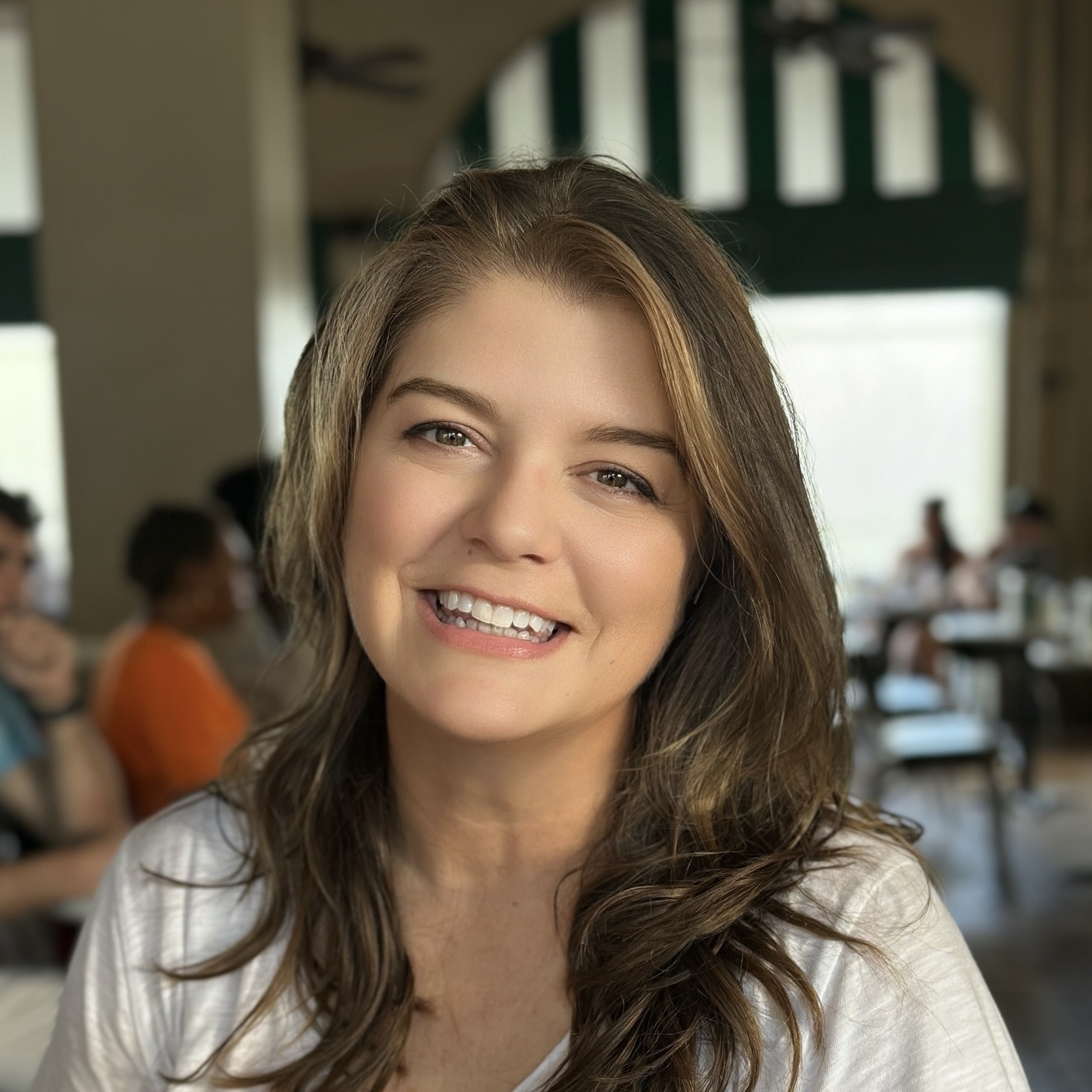


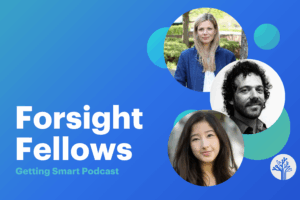

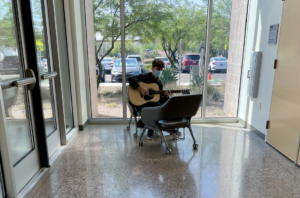
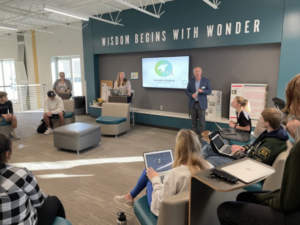

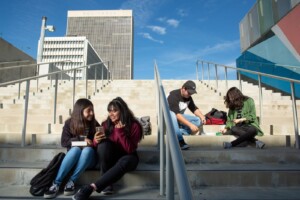
0 Comments
Leave a Comment
Your email address will not be published. All fields are required.